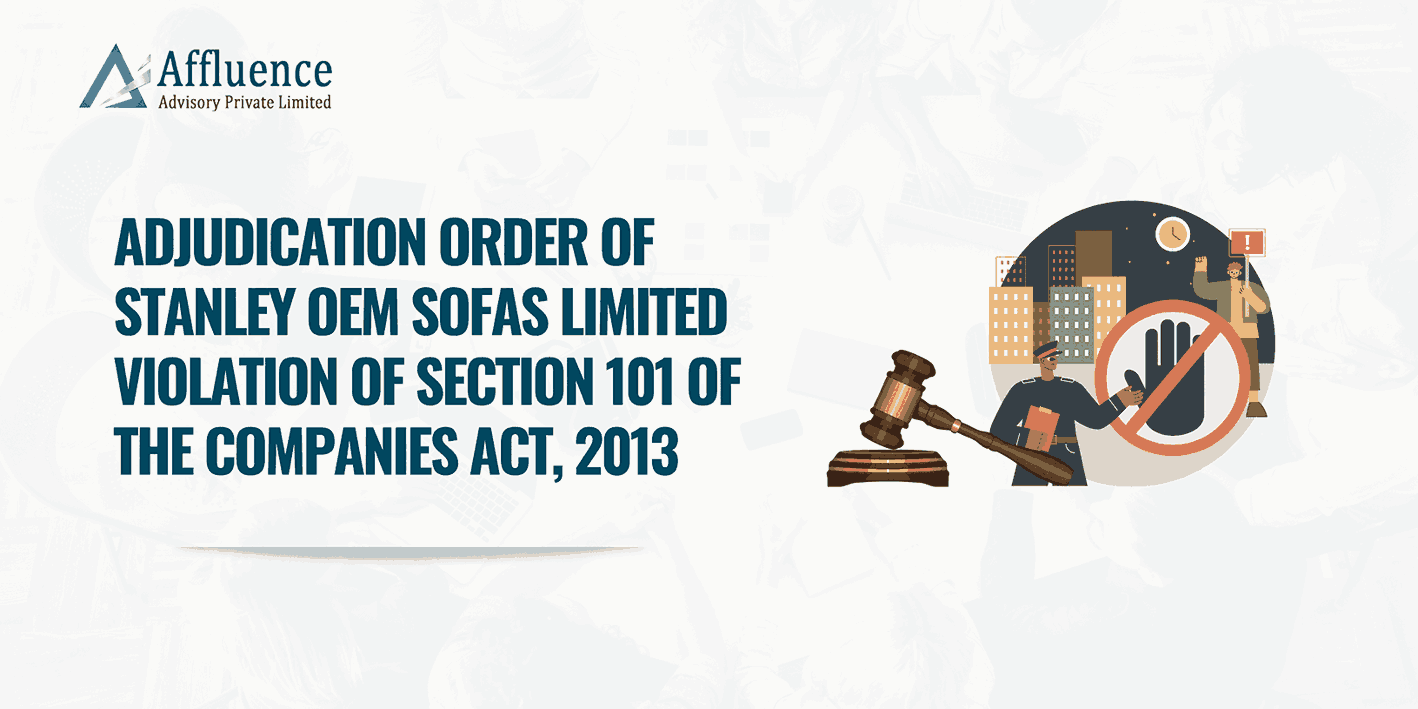Introduction
Timely and proper notice of general meetings is a fundamental compliance requirement under corporate law. Section 101 of the Companies Act, 2013, prescribes the rules for issuing notice of general meetings, including the duration, recipients, and manner of service. A recent adjudication order passed by the Registrar of Companies (ROC), Karnataka against Stanley OEM Sofas Limited, highlights the implications of non-compliance with Section 101 and serves as an important reminder to professionals regarding best practices and caution points.
Legal Provision: Section 101(1) of the Companies Act, 2013
A general meeting of a company may be called by giving not less than twenty-one clear days’ notice either in writing or through electronic mode in such manner as may be prescribed.
Key Highlights of Section 101(1)
- Notice Period:
- 21 clear days excludes both the date of dispatch and the date of the meeting.
- This implies the notice must be dispatched at least 23 days prior to the meeting date.
- Recipients of Notice:
- All shareholders (members)
- All directors
- The statutory auditor(s) of the company
Provision for Shorter Notice:
A company may convene a general meeting on shorter notice, only if the following condition is met:
- Consent of at least 95% of the members entitled to vote at such meeting.
- The consent must be obtained in writing or electronically.
- Verbal approvals or informal communications are not valid.
Violation:
The company conducted its AGM on 29.12.2020 on the same day as the Board Meeting where financials were approved. This violated Section 101(1) as:
- No 21 clear days’ notice was served.
- No 95% shareholder consent was submitted for shorter notice.
Penalty Imposed:
|
Name/Entity |
Amount (INR) |
|
Stanley OEM Sofas Limited |
10,000 |
|
Shubha Sunil (Director) |
10,000 |
|
Sunil Suresh (Director) |
10,000 |
|
Ananthakrishnan Viswanath (Director) |
10,000 |
|
Total |
40,000 |
Next Steps Directed:
- Pay penalty within 90 days from the date of the order.
- File Form INC-28 with a copy of the order and payment proof.
- Penalty must be paid from personal funds in case of directors.
Appeal, if any, can be filed before the Regional Director, South East Region, Hyderabad within 60 days of receiving the order.
AGM Notice Period and Shorter Notice Consent – Key Provisions under Companies Act, 2013
- Standard Notice Requirement
Under Section 101 of the Companies Act, 2013, a company is required to give a minimum 21 clear days’ notice for convening any General Meeting, including the Annual General Meeting (AGM). The notice can be sent either in physical form or through electronic means, as prescribed under the Act.
As per Secretarial Standard 2 on General Meetings, Notice shall be sent by hand or by ordinary post or by speed post or by registered post or by courier or by facsimile or by e-mail or by any other electronic means. ‘Electronic means’ means any communication sent by a company through its authorised and secured computer programme which is capable of producing confirmation and keeping record of such communication addressed to the person entitled to receive such communication at the last electronic mail address provided by the Member.
- Provision for Calling AGM with Shorter Notice – Public Companies
A company may convene a general meeting at shorter notice only if the requisite consent is obtained from the eligible members. Specifically, in the case of an AGM, shorter notice is permitted if not less than 95% of the members entitled to vote at the meeting provide their written or electronic consent.
Illustrative Examples:
If the company has 20 members: 95% equals 19 members. Therefore, consent from at least 19 members is required to call the AGM at shorter notice.
If the company has 19 members: 95% equals 18.05. Since fractional consent is not practical, consent must be obtained from all 19 members.
This rule ensures that a vast majority of shareholders are in agreement with the reduced notice period.
- Shorter Notice Consent – Private Companies
While Section 101 also applies to private companies, the Ministry of Corporate Affairs (MCA) has issued a notification dated 5th June 2015, which provides certain relaxations.
If the Articles of Association (AoA) of a private company allow for a shorter notice period, the provisions of Section 101 can be overridden.
In such cases, the AGM can be convened at a shorter notice without obtaining specific consent, provided it aligns with the AoA.
However, if the AoA are silent, the company must comply with the standard requirement of 21 days’ notice, unless 95% of the members entitled to vote agree in writing to a shorter notice.
Illustration:
If the AoA specifies only 3 days’ notice for an AGM, and members are duly notified accordingly, no further consent is needed, as this is a valid override under law.
- Shorter Notice for Circulating Financial Statements – Section 136
Section 136 of the Companies Act deals with the circulation of financial statements and related documents (e.g., auditor’s report, consolidated accounts, etc.).
The law requires that these documents be sent to shareholders and eligible parties at least 21 days before the AGM.
However, sending these documents at a shorter notice is permitted only if members consent as follows:
For companies with share capital: Consent from a majority in number of members entitled to vote, who together hold at least 95% of the paid-up share capital with voting rights.
For companies without share capital: Consent from members holding at least 95% of total voting power.
Example:
If a company has 3 shareholders:
A majority means at least 2 members.
These 2 members must collectively hold not less than 95% of the voting share capital.
Only with such consent can the company circulate the financial statements at less than 21 days’ notice.
Conclusion
Section 101 of the Companies Act, 2013, is a foundational provision that governs how companies must communicate and conduct their general meetings. It ensures that all stakeholders receive adequate and timely notice, enabling informed participation and decision-making.
Non-compliance with this section—whether due to oversight or procedural lapses—can lead to penalties, adjudication proceedings, and personal liability for directors. The law is clear: either give 21 clear days’ notice or secure 95% consent in writing for shorter notice. Simply convening the meeting without fulfilling these conditions renders the meeting irregular and non-compliant.
Companies are therefore advised to maintain proper documentation, dispatch notices correctly, record consents meticulously, and ensure internal processes align with statutory requirements. Following these practices not only protects the company from legal action but also reflects a commitment to good governance and accountability.
Disclaimer: This article provides general information existing at the time of preparation and we take no responsibility to update it with the subsequent changes in the law. The article is intended as a news update and Affluence Advisory neither assumes nor accepts any responsibility for any loss arising to any person acting or refraining from acting as a result of any material contained in this article. It is recommended that professional advice be taken based on specific facts and circumstances. This article does not substitute the need to refer to the original pronouncement.
CLICK HERE DOWNLOAD PDF








